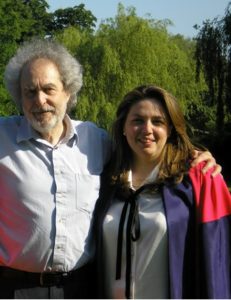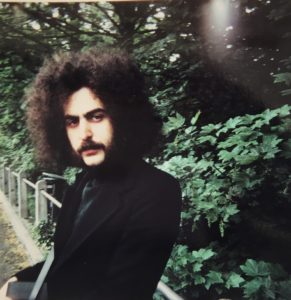A year on from his death, Marialena Trivella remembers Doug Altman and his lasting legacy on medical research, his colleagues, and friends
 It is just over a year since Doug Altman died. Is a year a long time? It is all relative of course, but it feels a long time without Doug’s presence. A recent analysis paper may well be his last publication in The BMJ. [1] It was published a year after his death. Fittingly, the paper highlights problems with the design and analysis of research in a specific medical area. Doug’s talent in astutely probing research methods was one of his best known attributes.
It is just over a year since Doug Altman died. Is a year a long time? It is all relative of course, but it feels a long time without Doug’s presence. A recent analysis paper may well be his last publication in The BMJ. [1] It was published a year after his death. Fittingly, the paper highlights problems with the design and analysis of research in a specific medical area. Doug’s talent in astutely probing research methods was one of his best known attributes.
Doug was the “go to” person for big and small questions. He was deeply knowledgeable and forward thinking, and he welcomed queries and visits from colleagues and collaborators seeking advice, guidance, or just a sounding board for discussing challenging methodological explorations or invitations to pioneering initiatives. He took great pleasure in sharing his expertise with humour and passion, and he had a unique insight into usual and unusual problems (statistical or not). He was an excellent communicator, inspiring teacher and collaborator, humble in nature but generous in spirit; a rare gem of a human being and a true friend. Personally, I feel blessed and inspired to have known him as a colleague and friend for the best part of 20 years.
Almost every person who knew him used the sentence “I’ll just have a quick word/email with Doug” at least once, if not multiple times. After June 2018, this was quickly replaced by “What would Doug think?”
The value that people attached to his professional opinion is a notable legacy in itself. But perhaps a legacy of much greater value is that those inspired by Doug can now give an answer to these questions with a degree of certainty, and follow his footsteps by abiding by similar principles.
It is difficult to explain the huge loss of Doug to people outside the area of medical research. During a vain attempt with colleagues to best describe the spirit of Doug, the fictional headmaster Albus Dumbledore from the Harry Potter series was brought into the conversation. Call it a transfiguration spell if you must, but suddenly the penny dropped and my interlocutor—although not a dedicated Harry Potter fan himself—immediately understood exactly who Doug was; he was the “Albus Dumbledore of the medical research world”, with many of the character’s qualities, and rightfully being treated with the same awe and affection as the fictional headmaster. Amazingly, and amusingly, you could take many references to the fictitious white haired wizard and apply them directly to the real white haired professor.
According to JK Rowling, author of the Harry Potter series, Dumbledore (briefly) “knows pretty much everything”, “he has always had to be the one who knew, and one who had the burden of knowing”, and “he is a genius, a very kind and wise man”. [2] People like Doug may be portrayed well as fictional characters, but don’t come about very often in real life. That is why his legacy lives on and will guide generations of researchers in performing their magic in research in medicine.
So, what would Doug think now, a year on?
- He would still roll his eyes in despair at the sight of a badly designed and reported research paper while applauding each additional journal choosing to adopt conduct and reporting guidelines and adequate statistical reviewing;
- He would still put patient benefit above all other goals, and would not hesitate to launch an intellectual war on unethical practices, inadequate research, and non-reproducible findings, that could ultimately compromise patient benefit;
- He would still work tirelessly towards minimising research waste, staying true to his motto, as true today as it was in 1994: “We need less research, better research, and research done for the right reasons”; [3]
- He would still approach matters from all logical corners, using common sense and detailed knowledge, to address concerns such as “the continuing dominance of statistical significance as a mark of truth, which is nonsense”; [4]
- He would still look for catchy acronyms for a study because “you can’t do good research without a good acronym”; [5]
- He would still invest in building solid, warm, and fruitful relationships—friendships even—with his collaborators. In his words “the best project results come from collaboration meetings where there is friendship, humour, and laughter”; [5] TRIPOD being one such example; [6]
- He would still be hugely observant of, amused by, and inspired by seemingly unconnected little things and remarks from people alien to his field, because their approach could resonate with a methodological question grappling his mind;
- He would still welcome academic dialogue to resolve or enhance methodological issues and would be kind and informative even when criticising other people’s work as his belief was that “you must stand up if you see something wrong but remember to be especially kind and constructive when criticising other people’s work”; [5]
- He would still be surrounded by seemingly untidy piles of paper to the untrained eye in all things ‘Doug’, but which were to him valuable printouts of interesting articles often annotated with hand-written comments (sometimes summarised as ‘Good stuff’, or ‘Nonsense’), organised in past, current, and future projects ideas for questions needing an answer;
- He would still welcome anyone knocking on his office door for a chat, whether scientific or not, he would appreciate a good joke, he would especially enjoy a good cartoon or news of his favourite sport teams, and would be proud to share some of his, almost professional quality, photographs from his extensive travels;
- He would still use humour: When he knew the end was near, just a day or two before his death, he finalised a list for trusted colleagues, with information on where important files are and his wishes on what to do with certain piles of paper. For one big unsorted pile of paper he simply wrote ‘Good luck’!
- Remarkably, he would still be genuinely surprised by people praising his extraordinary brilliance.
Doug channelled the exasperation he felt strongly about the scandal of poor medical research into positive, remedial action. [3] Through a mixture of pleasure and duty, he tirelessly and almost single-handedly forced change in the way we do research in medicine, [7,8] and established long lasting and beneficial foundations for the future of the field: the CONSORT(Consolidated Standards of Reporting Trials) guidelines, the EQUATOR (Enhancing the Quality and Transparency of Health Research) Network, and some Cochrane Methods Groups, [9,10,11] just a few of many examples.
 I am guessing that Doug would be initially surprised, possibly mildly horrified, but ultimately humbly amused to find himself referred to as the “Albus Dumbledore of medical research” (even more amused by the thought that he too, had longish—albeit not white—hair in his younger days) and possibly resonate with the headmaster’s wise words: “I have been hoping for this piece of evidence for a very long time. It confirms the theory on which I have been working, it tells me that I am right, and also how very far there is still to go…” [12]
I am guessing that Doug would be initially surprised, possibly mildly horrified, but ultimately humbly amused to find himself referred to as the “Albus Dumbledore of medical research” (even more amused by the thought that he too, had longish—albeit not white—hair in his younger days) and possibly resonate with the headmaster’s wise words: “I have been hoping for this piece of evidence for a very long time. It confirms the theory on which I have been working, it tells me that I am right, and also how very far there is still to go…” [12]
There is no greater legacy than his colleagues, friends, and collaborators being able to answer with confidence the question ‘what would Doug think?’, and follow his ethos.
Acknowledgement: Many thanks to Sue Altman for reading the piece and a photo of Doug.
 Marialena Trivella is senior researcher at the Centre for Statistics in Medicine, Nuffield Department of Orthopaedics, Rheumatology and Musculoskeletal Sciences, University of Oxford.
Marialena Trivella is senior researcher at the Centre for Statistics in Medicine, Nuffield Department of Orthopaedics, Rheumatology and Musculoskeletal Sciences, University of Oxford.
Competing interests: None declared
References:
- Trivella M, Stanworth SJ, Brunskill S, Dutton P, Altman DG. Can we be certain that storage duration of transfused red blood cells does not affect patient outcomes? BMJ (Clinical research ed) 2019; 365: l2320
- Wikipedia: https://en.wikipedia.org/wiki/Albus_Dumbledore
- Altman DG. The scandal of poor medical research. BMJ (Clinical research ed) 1994; 308(6924): 283-4
- MiRoR interview with D. Altman: http://miror-ejd.eu/2018/03/20/interview-with-professor-doug-altman/
- Personal communication. Verbatim, some of the words of advice from Doug Altman to many of us who worked or collaborated with him. Recorded and remembered fondly.
- The TRIPOD statement: https://www.tripod-statement.org/
- Professor Douglas Altman. BMJ 2009;339:b5542. doi: 10.1136/bmj.b5542
- BMJ Group Lifetime Achievement Award. BMJ 2010;340:c242. doi: 10.1136/bmj.c242
- The CONSORT statement: http://www.consort-statement.org/consort-2010
- The EQUATOR Network: http://www.equator-network.org/
- Cochrane, in memoriam: https://methods.cochrane.org/news/memoriam-doug-altman
- Rowling J. Harry Potter and the half-blood prince. Bloomsbury Publishing; 2015, Chapter: Horcruxes; p.415.
